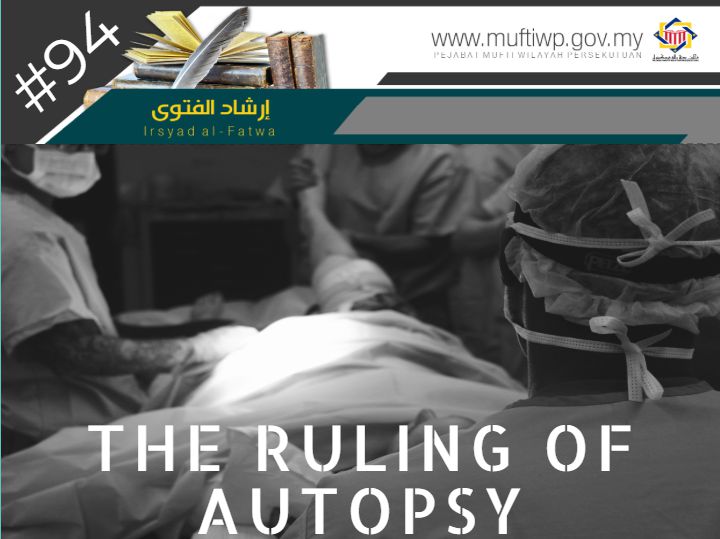
On 17th November 2015, located in Hotel Putra Kuala Lumpur, I was invited to hold a conference regarding the issue “Autopsy: A Choice or Necessity Through Islamic Perspective.” The conference was attended by forensic and medical experts from Malaysia. Thus, we explain the issue as the following.
The Honor of Humans
Before we review the issue further, we would like to explain about karamah insaniah (the honor of humans) first.
Basically, a Muslim is prohibited to be killed without reason (permitted by syarak). Protecting the honor of a Muslim after his death is the same as the rule of protecting him when he was alive.
In a hadith, the Prophet PBUH said:
كَسْرُ عَظْمِ الْمَيِّتِ كَكَسْرِهِ حَيًّا
“Breaking a deceased body’s bones is exactly like breaking them when he is alive.”
Sunan Abu Daud (3207)
Al-Imam Ibn Hajar Al-Asqalani said: “The wisdom from this hadith is that the honor of a mukmin lasts even after his death. His honor remains the same as when he was alive.” Fath Al-Bari (9/142)
Opinions of Fiqh Scholars (Fuqaha’)
However, the Islamic legal maxim states that the eminence of our religion is to benefit and not to harm. Hence, the fuqaha’ permits the surgery of an unborn baby from the womb of a mother that has died before being able to give birth to the child, if there is a high possibility of saving the child. Furthermore, the fuqaha’ also ruled it permissible to abort a pregnancy to save the mother, if there is a high possibility that the mother would die if the pregnancy progresses.
Whereas, if we refer to the opinions of early Islamic scholars, we find that they ruled it permissible to eat the flesh of other dead humans, if someone is in desperate situations (darurah). Al-Imam Tajuddin Al-Subki concluded the strongest opinion in mazhab Syafie that states the permissibility of eating the flesh of other dead humans in desperate situations.
According to the above opinions, we conclude that performing autopsy on a deceased body of a human is permissible if it is done to identify the cause of death, or for certain beneficial purposes, for example as a part of a syllabus in learning medicine.
Contemporary Fatwa
Here we include the fatwa issued from national and international fatwa institutions.
First: Fatwa of Council of Senior Scholars (Saudi Arabia)
The 9th Convention of Saudi Arabian Council of Senior Scholars held in Thaif during the month of Sya'ban in 1396 H, discussed the ruling of the issue filed by the Malaysian embassy asking the Saudi Arabian government to clarify their stand on performing surgery or operation on the body of a deceased Muslim. Then, the Saudi Arabian Council of Senior Scholars explained the following three sections:
- Surgery or autopsy done to identify a crime committed
- A surgery to identify infectious diseases, in order to implement preventive measures and preventing the spread of the disease
- The surgery purpose is as a part of the process of teaching and learning
The convention has concluded that all three situations stated above is permissible.
Second: National Fatwa of Malaysia
The 61st Muzakarah of National Fatwa Council convened on 27th January 2004 discussed the ruling of performing autopsy for cases reported where death was not categorized as a criminal case had decided:
The original ruling of performing surgery on a deceased is prohibited, however it is permissible in desperate situation when it becomes a necessity, such as when it is done for the purpose of research of deadly diseases, identifying the cause of death, research as well as education, especially in the field of medicine.
Conclusion
An Islamic legal maxim states: When the benefit of the general public conflicts with personal benefit, thus, the general public’s benefit is prioritized. In the issue of performing autopsy on the body of a deceased, it will dishonor the deceased. However, identifying the source of the disease and preventing the disease from spreading is a general or public’s benefit. Hence, it is permissible to perform autopsy on a deceased for the reasons stated above.
Closing
Lastly, we suggest the medical personnel responsible for post mortem of a deceased to follow the following criteria:
- Maintain the honor of the deceased
- Be mindful of the manners and ethics of performing the autopsy
- The decision to perform autopsy is made only when there is a desperate reason or necessity to do so.
- If there are bodies of a non-Muslim and a Muslim, choose the body of a non-Muslim first if the autopsy is for medical purposes or identification of disease.
- If there is an alternative method of teaching autopsy, then choose other methods first, that could avoid dishonoring the deceased.
- If the family of the deceased refuse to consent for an autopsy, then respect their decision. However, if the autopsy is crucial, then comfort the family and explain the benefit of performing the autopsy. The reason is, Allah SWT has commanded us to be fair and benevolence. And by being fair, it includes identifying the cause of death of the deceased to defend the decease’s death in certain cases.
May this explanation benefit us all. With this opportunity, I would like to thank all the medical staff for working and completing their noble task of helping people every day. Jazakumullahu khayran.

